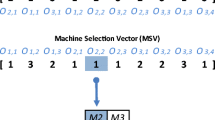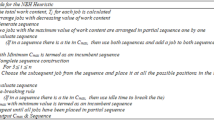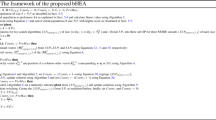Abstract
The Permutation Flow Shop Scheduling Problem (PFSSP) is an interesting scheduling problem that has many real-world applications. It has been widely used as a benchmark to prove the efficiency of many discrete optimization algorithms. The DJaya algorithm is a discrete variation of the Jaya algorithm that has been recently proposed for solving discrete real-world problems. However, DJaya may get stuck in a local optima because of some limitations in its optimization operators. In this paper, we propose a new discrete optimization algorithm called Discrete Jaya with Refraction Learning and Three Mutation Methods (DJRL3M) for solving the PFSSP. DJRL3M incorporates five modifications into DJaya. First, it utilizes Refraction Learning (RL), which is a special type of opposition learning, to generate a diverse initial population of solutions. Second, it uses three mutation methods to explore the search space of a problem: DJaya mutation, highly disruptive polynomial mutation and Pitch Adjustment mutation. Third, it employs RL at each iteration to generate the opposite solutions of the best and worst solutions in an attempt to jump out local optima. Fourth, it uses the abandon method at the end of each iteration to discard a predefined percentage of the worst solutions and generate new random solutions. Finally, it uses the smallest position value to determine the correct values of the decision variables in a given candidate solution. The performance of DJRL3M was evaluated and compared with six well-recognized optimization algorithms [(New Cuckoo Search (NCS) (Wang et al. in SC 21:4297–4307, 2017), DJaya (Gao et al. in ITC 49:1944–1955, 2018), Hybrid Harmony Search (HHS) (Zhao et al. in EAAI 65:178-199, 2017), Modified Genetic algorithm (MGA) (Mumtaz et al. in: Advances in Manufacturing Technology XXXII: Proceedings of the 16th International Conference on Manufacturing Research, incorporating the 33rd National Conference on Manufacturing Research, 2018), Generalised Accelerations for Insertion-based Heuristics (GAIbH) (Fernandez-Viagas et al. in EJOR 282:858–872, 2020), Memetic algorithm with novel semi-constructive crossover and mutation operators (MASC) (Kurdi in ASC 94:106548, 2020)] using a set of Taillard’s benchmark instances. The experimental and statistical results show that DJRL3M obtains better performance than the performance of NCS, DJaya, HHS and MGA and exhibits competitive performance compared to the performance of MASC and GAIbH.



Similar content being viewed by others
References
Wang H, Wang W, Sun H, Cui Z, Rahnamayan S, Zeng S (2017) A new cuckoo search algorithm with hybrid strategies for flow shop scheduling problems. Soft Comput 21(15):4297–4307
Gao K, Yang F, Zhou M, Pan Q, Suganthan PN (2018) Flexible job-shop rescheduling for new job insertion by using discrete jaya algorithm. IEEE Trans Cybern 49(5):1944–1955
Zhao F, Liu Y, Zhang Y, Ma W, Zhang C (2017) A hybrid harmony search algorithm with efficient job sequence scheme and variable neighborhood search for the permutation flow shop scheduling problems. Eng Appl Artif Intell 65:178–199
Mumtaz J, Zailin G, Mirza J, Rauf M, Sarfraz S, Shehab E (2018) Makespan minimization for flow shop scheduling problems using modified operators in genetic algorithm. In: Advances in Manufacturing Technology XXXII: Proceedings of the 16th International Conference on Manufacturing Research, incorporating the 33rd National Conference on Manufacturing Research, September 11–13, 2018, University of Skövde, Sweden. 8: 435. IOS Press
Fernandez-Viagas V, Molina-Pariente JM, Framinan JM (2020) Generalised accelerations for insertion-based heuristics in permutation flowshop scheduling. Eur J Oper Res 282(3):858–872
Kurdi M (2020) A memetic algorithm with novel semi-constructive evolution operators for permutation flowshop scheduling problem. Appl Soft Comput 94:106458
Garey MR, Johnson DS (1979) Computers and intractability: a guide to the theory of np-completeness: Wh free.Co., San Fr. 90(1)
Mishra A, Shrivastava D (2020) A discrete jaya algorithm for permutation flow-shop scheduling problem. Int J Ind Eng Comput 11(3):415–428
Abdel-Basset M, Manogaran G, El-Shahat D, Mirjalili S (2018) A hybrid whale optimization algorithm based on local search strategy for the permutation flow shop scheduling problem. Fut Gener Comput Syst 85:129–145
Abed-alguni BH, Alkhateeb F (2020) Intelligent hybrid cuckoo search and \(\beta \)-hill climbing algorithm. J King Saud Univ Comput Inf Sci 32(2):159–173
Abed-alguni BH, Alkhateeb F (2017) Novel selection schemes for cuckoo search. Arab J Sci Eng 42(8):3635–3654
Abed-alguni BH, Klaib AF, Nahar KM (2019) Island-based whale optimization algorithm for continuous optimization problems. Int J Reason Based Intell Syst 11:319
Ahmadizar F (2012) A new ant colony algorithm for makespan minimization in permutation flow shops. Comput Ind Eng 63(2):355–361
Chen CL, Tzeng YR, Chen CL (2015) A new heuristic based on local best solution for permutation flow shop scheduling. Appl Soft Comput 29:75–81
Rao R (2016) Jaya: a simple and new optimization algorithm for solving constrained and unconstrained optimization problems. Int J Ind Eng Comput 7(1):19–34
Rao RV, Saroj A (2017) Constrained economic optimization of shell-and-tube heat exchangers using elitist-jaya algorithm. Energy 128:785–800
Raut U, Mishra S (2019) An improved elitist-jaya algorithm for simultaneous network reconfiguration and dg allocation in power distribution systems. Renewable Energy Focus 30:92–106
Rao RV, Saroj A (2019) An elitism-based self-adaptive multi-population jaya algorithm and its applications. Soft Comput 23(12):4383–4406
Migallón H, Jimeno-Morenilla A, Sánchez-Romero J, Rico H, Rao RV (2019) Multipopulation-based multi-level parallel enhanced jaya algorithms. J Supercomput 75(3):1697–1716
Jimeno-Morenilla A, Sánchez-Romero J-L, Migallón H, Mora-Mora H (2019) Jaya optimization algorithm with gpu acceleration. J Supercomput 75(3):1094–1106
Nayak DR, Zhang Y, Das DS, Panda S (2019) Mjaya-elm: A jaya algorithm with mutation and extreme learning machine based approach for sensorineural hearing loss detection. Appl Soft Comput 83:105626
Deb K, Tiwari S (2008) Omni-optimizer: a generic evolutionary algorithm for single and multi-objective optimization. Eur J Oper Res 185(3):1062–1087
Geem ZW, Kim JH, Loganathan GV (2001) A new heuristic optimization algorithm: harmony search. Simulation 76(2):60–68
Yang X-S, Deb Suash (2009) Cuckoo search via lévy flights. In World Congress on Nature & Biologically Inspired Computing. NaBIC 2009., pp 210–214
Tasgetiren F, Chen A, Gencyilmaz G, Gattoufi Said (2009) Smallest position value approach. In: Differential Evolution: A Handbook for Global Permutation-Based Combinatorial Optimization. pp 121–138. Springer
Alkhateeb F, Abed-Alguni BH (2019) A hybrid cuckoo search and simulated annealing algorithm. J Intell Syst 28:683
Abed-alguni BH, Klaib AF (2018) Hybrid whale optimisation and \(\beta \)-hill climbing algorithm. Int J Comput Sci Math 0(0):1–13
Abed-alguni BH, Alawad NA, Barhoush M, Hammad Rafat (2021) Exploratory cuckoo search for solving single-objective optimization problems. Soft Comput. https://doi.org/10.1007/s00500-021-05939-3
Abed-Alguni BH, Paul DJ (2018) Hybridizing the cuckoo search algorithm with different mutation operators for numerical optimization problems. J Intell Syst 29(1):1043–1062
Deb K, Agrawal RB (1994) Simulated binary crossover for continuous search space. Complex Syst 9(3):1–15
Alawad NA, Abed-alguni BH (2020) Discrete island-based cuckoo search with highly disruptive polynomial mutation and opposition-based learning strategy for scheduling of workflow applications in cloud environments. Arab J Sci Eng 46:3213
Abed-alguni BH, Alawad NA (2021) Distributed grey wolf optimizer for scheduling of workflow applications in cloud environment. Appl Soft Comput J 102:107113
Lin J, Wang ZJ, Li X (2017) A backtracking search hyper-heuristic for the distributed assembly flow-shop scheduling problem. Swarm Evol Comput 36:124–135
Taillard E (1990) Some efficient heuristic methods for the flow shop sequencing problem. Eur J Oper Res 47(1):65–74
Stützle T (1998) Applying iterated local search to the permutation flow shop problem
Zhao F, Liu Y, Zhang C, Wang J (2015) A self-adaptive harmony pso search algorithm and its performance analysis. Expert Syst Appl 42(21):7436–7455
Abed-alguni BH (2019) Island-based cuckoo search with highly disruptive polynomial mutation. Int J Artif Intell 17(1):57–82
Setti G, Mazzini G, Rovatti R, Callegari S (2002) Statistical modeling of discrete-time chaotic processes-basic finite-dimensional tools and applications. Proc IEEE 90(5):662–690
Caldeira RH, Gnanavelbabu A (2019) Solving the flexible job shop scheduling problem using an improved jaya algorithm. Comput Ind Eng 137:106064
Marichelvam MK (2012) An improved hybrid cuckoo search (ihcs) metaheuristics algorithm for permutation flow shop scheduling problems. Int J Bio-Inspir Comput 4(4):200–205
Lian Z, Xingsheng G, Jiao B (2008) A novel particle swarm optimization algorithm for permutation flow-shop scheduling to minimize makespan. Chaos Solitons Fract 35(5):851–861
Derrac J, García S, Molina D, Herrera F (2011) A practical tutorial on the use of nonparametric statistical tests as a methodology for comparing evolutionary and swarm intelligence algorithms. Swarm Evolut Comput 1(1):3–18
Friedman M (1940) A comparison of alternative tests of significance for the problem of m rankings. Ann Math Stat 11(1):86–92
García S, Fernández A, Luengo J, Herrera F (2010) Advanced nonparametric tests for multiple comparisons in the design of experiments in computational intelligence and data mining: Experimental analysis of power. Inf Sci 180(10):2044–2064
Gehan EA (1965) A generalized wilcoxon test for comparing arbitrarily singly-censored samples. Biometrika 52(1–2):203–224
Chen S-H, Chang P-C, Cheng TCE, Zhang Q (2012) A self-guided genetic algorithm for permutation flowshop scheduling problems. Comput Oper Res 39(7):1450–1457
Abed-Alguni BH, Paul DJ, Chalup SK, Henskens FA (2016) A comparison study of cooperative Q-learning algorithms for independent learners. Int J Artif Intell TM 14(1):71–93
Abed-alguni BH, Chalup SK, Henskens FA, Paul DJ (2015) A multi-agent cooperative reinforcement learning model using a hierarchy of consultants, tutors and workers. Vietnam J Comput Sci 2(4):213–226
Abed-alguni BH, Chalup SK, Henskens FA, Paul DJ (2015) Erratum to: A multi-agent cooperative reinforcement learning model using a hierarchy of consultants, tutors and workers. Vietnam J Comput Sci 2(4):227–227
Abed-alguni BH, Ottom MA (2018) Double delayed Q-learning. Int J Artif Intell TM 16(2):41–59
Abed-Alguni BHK (2014) Cooperative reinforcement learning for independent learners. PhD thesis, Faculty of Engineering and Built Environment, School of Electrical Engineering and Computer Science, The University of Newcastle, Australia
Abed-alguni BH (2017) Bat Q-learning algorithm. Jordan J Comput Inf Technol 3(1):56–77
Abed-alguni BH (2018) Action-selection method for reinforcement learning based on cuckoo search algorithm. Arab J Sci Eng 43(12):6771–6785
Abed-alguni BH, Barhoush M (2018) Distributed grey wolf optimizer for numerical optimization problems. Jordan J Comput Inf Technol 4(03)
Alawad NA, Anagnostopoulos A, Leonardi S, Mele I, Silvestri (2016) Network-aware recommendations of novel tweets. In: Proceedings of the 39th International ACM SIGIR Conference on Research and Development in Information Retrieval. pp 913–916. ACM
Author information
Authors and Affiliations
Corresponding author
Additional information
Publisher's Note
Springer Nature remains neutral with regard to jurisdictional claims in published maps and institutional affiliations.
Rights and permissions
About this article
Cite this article
Alawad, N.A., Abed-alguni, B.H. Discrete Jaya with refraction learning and three mutation methods for the permutation flow shop scheduling problem. J Supercomput 78, 3517–3538 (2022). https://doi.org/10.1007/s11227-021-03998-9
Accepted:
Published:
Issue Date:
DOI: https://doi.org/10.1007/s11227-021-03998-9




